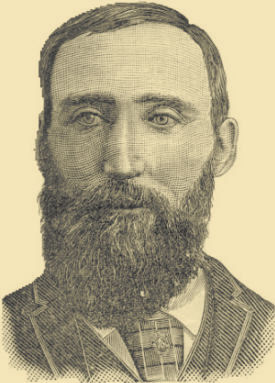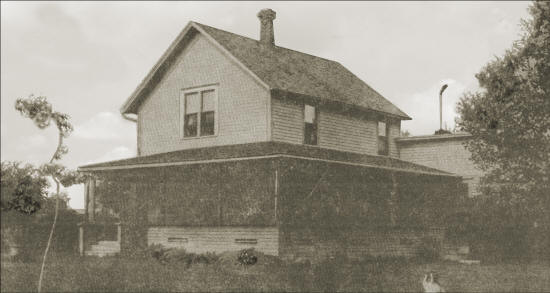|
|
|
Clark County Press, Neillsville, WI October 19, 1994, Page 28 Transcribed by Dolores (Mohr) Kenyon. Index of "Good Old Days" Articles
|
|
|
|
Clark County Press, Neillsville, WI October 19, 1994, Page 28 Transcribed by Dolores (Mohr) Kenyon. Index of "Good Old Days" Articles
|
Good Old Days
By Dee Zimmerman
The Village of Chili was started when the Omaha railroad was built in 1890. Before then, the principal settlers of that community were Ira and Sydney Fike. Born in Canada, they traveled to New York in 1862. After serving in the Army for two years, they went to Adams County, Wis., in 1868 and moved to Clark County four years later.
Ira Fike was chairman of the Town of Fremont for six years. He was overseer of the county farm for three years and served on the county board of supervisors. He accumulated large parcels of property during his lumbering operations, for a Necedah firm later developing the land for farming purposes.
Whiston Davis was also one of the early settlers. P. N. Christenson operated a saw mill there for many years. After the village plot was laid out, it had a steady growth, reaching a population of about 200 in the year of 1915. The other businesses at that time were a farmers cooperative produce company, a bank, two general stores, a hardware store, cheese factory, garage, harness shop, meat market and a potato warehouse.
Circa 1913 1914, Chili made front page news in several Wisconsin newspapers when a stranger, dropping off the after-noon train, entered the bank, held a gun upon the cashier and made away with a large sum of money. Although the alarm was sounded and many men joined in the search for miles around, neither man nor money were ever found.
The Chili Business Directory read as follows: Chili Co-op Produce; Chili State Bank; H. Degener Hardware; Harry Eide Cheese Factory; A. Hogenson General Store; Geo. S. Ives Garage; L. A. Reichert General Store; A. J. Singer Harness Shop; Wm. Voelker Meats & Chas. Voight Cheese Factory.
The Village of Lynn and Town of Lynn, by the same name, were founded by George Ure and Gottlieb Sternitzky. The two pioneers came from Chicago in 1855. Ure paid $300 for an 80 acre parcel, which he never saw before buying it, the land proved to be a wise purchase, good soil, being worth much more by the turn of the century.
Ure and Sternitzky drove from Sparta with a team of horses to settle in the area of Ures newly purchased land. Bartemus Brooks and sons, Alonzo, Dan and Erwin, were also among the first settlers. Archibold Yorkston arrived shortly after, then Frederick Yankee with his sons, August, William, Herman and Henry, all who became Clark County residents.
Back in that time period, it was the custom for all settlers to club together and go to Sparta once a year to buy flour. One year, Mr. Hoover was too sick to accompany the caravan and when the others returned, they found him with no flour in his house. He dickered with a neighbor for a barrel of flour in exchange for forty acres of land, on which later over a million feet of pine timber was cut by W. T. Price.
Lynn was a station on the branch line of the Chicago, Milwaukee and St. Paul railroad up from Babcock where it connected with the main line. That line crossed the Omaha railroad a half mile from Lynn.
Bright was a station on the Fairchild & Northwestern railroad five miles south of Owen, named after an affluent resident of Black River Falls who owned a large stock farm there in 1915.
Dewhurst and Brooks were names of little settlements in the Town of Sherwood, southeast corner of the county. Each settlement had a general store.
Shortly after 1900, Ignatz Ceznic started to organize a colony of settlers in the Town of Hendren. Many of (the) Slovic background purchased land in that township developing prosperous farms with the village of Willard as their market place. The F & NE railroad served them with the source of transportation for goods and lifeline to other areas. Circa 1910-1920, there were two stores operated by Justic & Kochianchich and John Zoller, as well as a creamery and other enterprises.
Globe, an inland town, ten miles northwest of Neillsville, was in the center of a prosperous farming community. It had a large German Lutheran Church, and school, a creamery and store conducted by Linus Prock.
The little settlement of Hemlock, located along the Black River between Greenwood and Owen-Withee was one of great importance in the countys early days. It was one of the chief trading centers and was the site of a dam, a grist mill and saw mill. The dam was built in 1879 at a cost of $21,000. High waters due to an abundance of spring rains took the dam out in c.1913-1914.
Christie, located on the old tote road between Neillsville and Greenwood, had a population of 150 people in 1915. For years it had a most important post office of the county, near the turn of the century. Frank Wheeler owned a prosperous general store during that time.
Another early, prosperous village was Longwood, before the days of Owen, Thorp and Withee. It had a post office and large trading station prior to the mail carrier days. Later, a store was owned by Erickson & Thorson and a cheese factory with Henry Mathias as its proprietor. It had a population of 50.
The settlement of Veefkind, in the Town of Sherman had a population of 100 persons and was located on the Soo Railway branch. Mrs. M. Schultz owned the general store there in 1915.
Spokeville was a crossroads village of 50 people on the Soo line, southeast of Loyal. John B. Gerdes owned and operated the general store. Gust Voigt was the proprietor of the creamery and cheese factory.
Clark County had several small villages within its boundaries during the early 1900s.
A hurricane can raze a town, but cant unseal a letter or open a knot. Paul Valery
The direction in which education starts a man will determine his future life. Plato
 |
IRA FIKE
Ira Fike, born in Canada, came to the Town of Fremont and Chili area in 1872. Coming to Wisconsin with no capital, he started working in the lumbering business, and then bought land that he developed into farming. Eventually, he accumulated a large property holding and was considered financially successful. He served as town chairman and chairman of the County Board of Supervisors.
|
|
HERMAN YANKEE
Herman Yankee, a Wisconsin native, born in Washington County in 1854, came to Clark County with his parents when he was quite young. He was of German descent and a farmer by occupation. He developed a large well cultivated farm in the Town of Lynn. Miss Louisa Richard of Sparta became his wife and they had five children. Yankee played an active role in local government, serving on various positions of the town board as well as representing his town on the county board.
|
|
The Chili State Bank as it appeared circa 1915. They ran an advertisement which read: Just because we are the smallest bank in Clark Co., yet .
 |
Residence on the W. Scott Davis Farm, Granton
|
|
The garage of Knorr A. Rausch, Ford Dealers, Granton, 1915
(Photos courtesy of Mrs. W. H. Lauer)
|
© Every submission is protected by the Digital Millennium Copyright Act of 1998.
Show your appreciation of this freely provided information by not copying it to any other site without our permission.
Become a Clark County History Buff
|
|
A site created and
maintained by the Clark County History Buffs
Webmasters: Leon Konieczny, Tanya Paschke, Janet & Stan Schwarze, James W. Sternitzky,
|